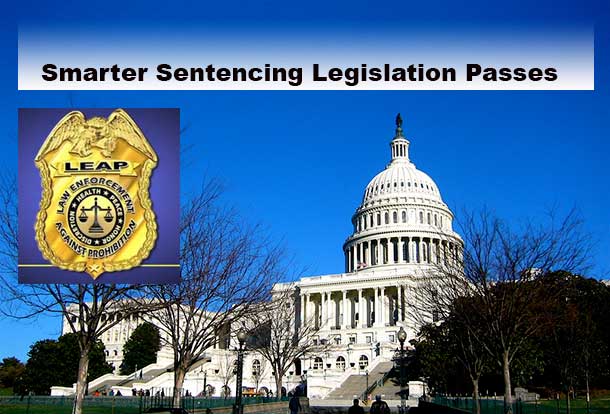
WASHINGTON – A bipartisan group of legislators today passed The Smarter Sentencing Act, a bill that would enact some of the most sweeping changes to drug policy in decades. Introduced by Assistant Majority Leader Dick Durbin (D-IL) and Senator Mike Lee (R-UT) and supported by Senators Rand Paul (R-Kentucky), Jeff Flake (R-Arizona), Ted Cruz (R-TX), Patrick Leahy (D-VT), Carl Levin (D-MI) and Sheldon Whitehouse (D-RI), the legislation has three main parts.
First, it would expand application of the federal legislative “safety valve” that allows judges discretion to give nonviolent drug offenders sentences below those called for by harsh mandatory minimums. Second, it would release some nonviolent prisoners incarcerated for crack cocaine offenses before those sentences were found to be racially biased and were reformed by Congress in the Fair Sentencing Act of 2010. Finally, it would expand the individual review of drug cases, giving judges more discretion to decide the most appropriate sentence based on the circumstances of the case.
“At last we are fixing laws enacted hastily 30 years ago,” said Law Enforcement Against Prohibition (LEAP) speaker Eric Sterling, who helped write some of the laws the Committee voted to reform while Counsel for the House Judiciary Committee during the Reagan Administration. “You don’t have to be an expert in criminal justice to understand the commonsense that underlies these reforms. Appropriate punishment is always more effective than excessively harsh punishment. That this reform is bipartisan is another important sign that America is moving away from the exaggerated fears around drugs that distorted policymaking in the 1970s and 1980s.”
Despite decades of calls for change from both drug policy reform advocates and criminal justice professionals about the injustices arising from mandatory minimums, and despite the fact that the bill neither repeals minimums nor lowers the maximum sentence for any offense, the National Association of Assistant U.S. Attorneys sent a letter of opposition to Attorney General Eric Holder, who supports reform, yesterday.
“This bill does nothing but return some authority to judges to decide cases on their individual merits, as the Founders envisioned,” stated LEAP executive director Neill Franklin. “While I would like to see us go much further in questioning the basic logic of dealing with drugs as a law enforcement issue, this is an excellent step toward smarter drug policy.”









